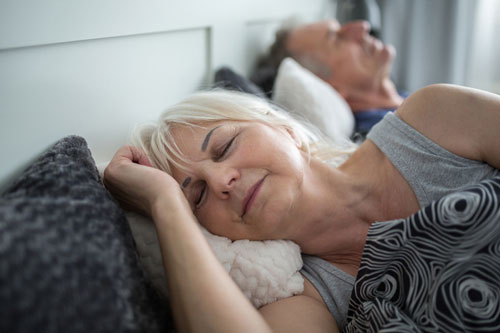Insomnia is one of the most frustrating health problems. Not only is it extremely common (about 31% of Americans suffer from it), but the cause is often hard to pin down.[1]
That makes curing it difficult.
So people resort to sleeping pills, which don’t work well in the long term and have serious side effects.
A new study shows that insomnia may be caused by something almost of all of us have started doing in the last 20 years. And when we reduce this habit, our good sleep returns.[2]
The research was presented at the European Society of Endocrinology annual meeting. Scientists looked at 25 people who were avid users of a computer, cell phone, or tablet. They were on them an average of four hours a day. All suffered from insomnia.
The researchers then gauged how the subjects slept when they:
- Used their phones before bed.
- Wore blue-light blocking glasses while using their phones before bed.
- Didn’t use their phones before bed.
After one week, subjects who used the light-blocking glasses or didn’t use their phones before bed fell asleep 20 minutes sooner. And they felt less tired during the day.
The sleep-depriving culprit is blue light. It is produced by most types of device screens. Blue light tells out brains to turn off melatonin production. Melatonin is a hormone that relaxes us and makes us sleepy.
Professor Dirk Jan Stenvers was on the research team. He said that insomnia “can be reversed by minimizing evening screen use or exposure to blue light.”
5 Ways to Cut Blue Light Exposure
This study backs up other research that has found blue light can wreck your sleep. Here are five ways to avoid it…
1. Secure your bedroom. Keep your bedroom as dark as possible at bedtime.
2. Enforce a screen curfew. Stop using computers, tablets, smartphones, TVs, or other devices within two hours of bedtime.
3. Use a night light, night shift, or twilight settings. Most devices have a setting that allow you to reduce blue light after dark. For Windows devices, go to Start> Settings> System> Display> Night light settings.
For Apple devices, go to Settings> Display & Brightness> Night Shift.
For Samsung phones, go to Settings> Display> Blue light filter.
4. Use an anti-blue light app. Some android phones don’t have blue light blocking features. Instead, you can use an app that does the job. One of the most popular is called f.lux. You can download it here.
5. Back off. Keep the screen at least 14 inches from your face.
One more thing…
If you suffer from insomnia, you’ll want to know about a simple breathing trick that can end your sleepless nights. Learn about it in Independent Healing, the monthly journal that brings you science-backed health advice you won’t find anywhere else. Go HERE to subscribe.
Related Articles
Study Uncovers Easy Insomnia Cure
This Natural Drink Fights Insomnia
Ancient Herb Safely Beats Insomnia
Like this Article? Forward this article here or Share on Facebook.
[1]https://www.ncbi.nlm.nih.gov/pmc/articles/PMC2717193/
[2]https://www.eurekalert.org/pub_releases/2019-05/esoe-spi051519.php

